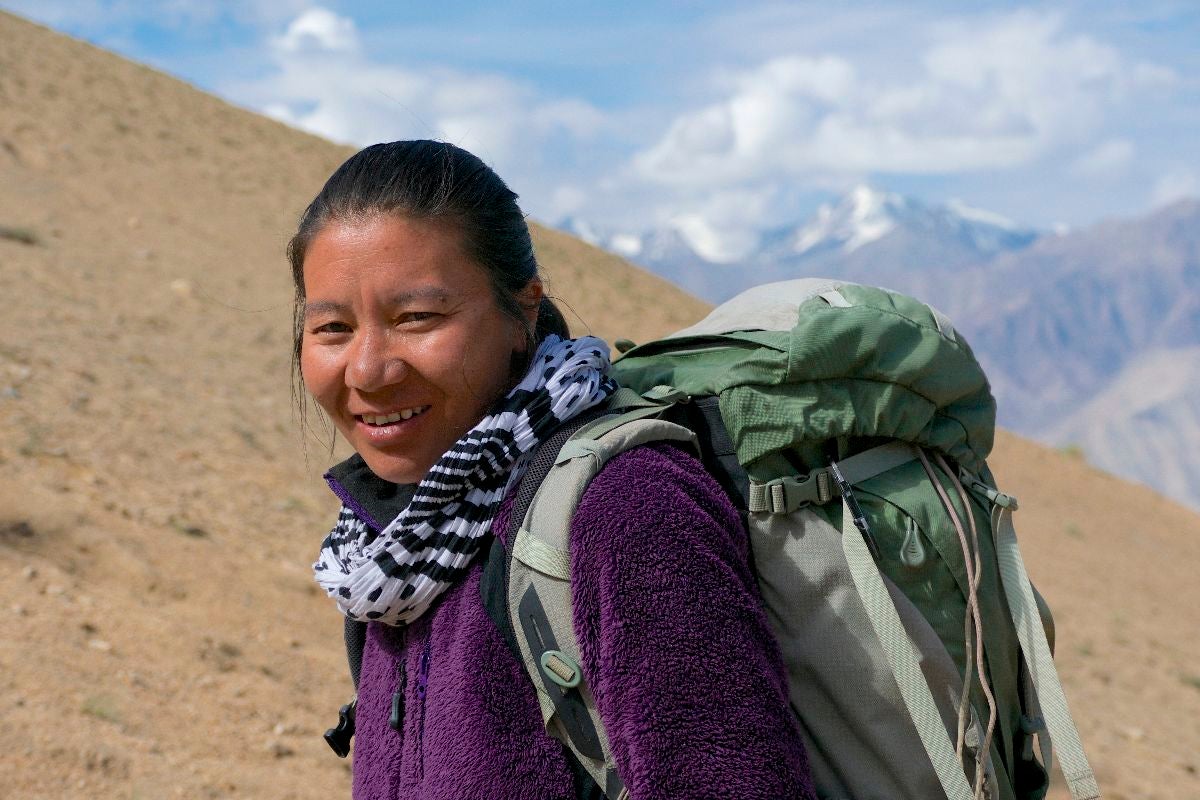This Women-Run Guide Service is Changing Himalayan Trekking in India

'Courtesy'
“You’re a woman.”
When trekking guide Thinlas Chorol heard these words, she knew she was about to miss out on a job. For years, local tour operators in India’s mountainous Ladakh region used her gender as an excuse to reject her in favor of men.
Thinlas’s response was to strike out on her own. Today, she is the founder of the Ladakhi Women’s Travel Company, the only women-owned and operated trekking agency in the Great Himalayas of Ladakh, and is using her position to change the rules on who gets to adventure for a living in one of the world’s most beautiful mountain ranges.
As a child living in the small village of Takmachik, Thinlas fell in love with the mountains. She dreamed of being a guide, but she says that her community did not see it as a fitting career for a woman. In 2004, while a student at the Students’ Educational and Cultural Movement of Ladakh, she began trekking regularly; on one outing, she told Indian news outlet Your Story, locals spoke to her in English, assuming she was a foreigner. “The very thought of a local being a trekker never crossed their minds,” she said.
While she went on to occasionally work as a freelance guide, local operators passed over her for most jobs. Some suggested that she instead become a monastery guide, a less physical profession that tour operators believed would better suit a woman.
Instead of bowing to her critics’ wishes, Thinlas doubled down on her dream. She took a mountaineering course at Nehru Mountaineering Institute in 2007, and in 2008, she obtained a scholarship to attend a NOLS wilderness training program.
Still, local tour agencies continued to reject her. So in 2009, Thinlas founded the Ladakhi Women’s Travel Company, which has since become the go-to agency for travelers who wish to trek with female guides and porters.
Last October, I headed to Ladakh to see her success story for myself. After 15 years as a prosecutor in Washington, D.C., I had just left to run my own adventure travel company, Peak Explorations, trading stability for the unpredictable life of a digital nomad. I started my company to serve solo travelers while empowering women and practicing sustainable tourism in indigenous communities. But when I started out, I felt alone—few women of color like Thinlas and myself run adventure travel companies. Watching her agency’s steady growth renewed my determination to succeed in our male-dominated industry.
As I walked into the Ladakhi Women’s Travel Company coffee shop, Thinlas greeted me with a smile and a cup of chai. With her small stature, soft voice, and calm demeanor, she can come across as unassuming at first. But when she’s at work, Thinlas describes herself as “direct”; some, she says, have called her rude.
The goal of the Ladakhi Women’s Travel Company is bigger than guiding tourists, Thinlas says. Domestic violence is common in Ladakh, and she wants to create a generation of women who have the independence to defy it.
“Times are changing,” she says. “When you give women jobs, they gain the choice to leave bad and abusive relationships and choose safety instead. That’s empowerment.”
But building her company has been a challenge for Thinlas from the start. First, she had to convince local women that they could be guides too; that meant not only scouting out candidates with the drive to succeed but also polishing their English so they could effectively guide foreign clients. Thinlas teaches her guides and porters herself, and says she tries to drill in both the professional values of honesty and respect and the importance of sharing Ladakhi culture with visitors.
Over time, LWTC has seen its customer base grow through word of mouth to the point where it employs 30 female guides and porters and still occasionally has trouble meeting demand. In the process, the agency has become the undisputed leader for women-led treks, and often fields referrals from other tour operators in the area. For all of her work, in 2017 the Indian government recognized Thinlas with the Nari Shakti Puraskar award, which honors those who have advanced the status of women in India.
After meeting Thinlas, I trekked in the high-altitude Sham Valley for four days with Yangdol, a twentysomething LWTC trainee. When we had trouble finding a local home to stay in at one village, Yangdol carefully sorted through our options for the night. After several failed attempts at finding a place for us, she managed to convince a local family who didn’t normally take in foreigners to welcome us. As a foreigner without the ability to converse with the locals, I found Yangdol to be a much-needed safety net. She had sought out a career in guiding to support her family, she said, and Thinlas’s company had empowered her to do so.
“Women should think for themselves. If they believe in themselves, they can achieve what they want,” Thinlas said. “Women should not listen to what society is saying, they should listen to their own ability to work. Then, definitely, they will succeed if they work hard.”